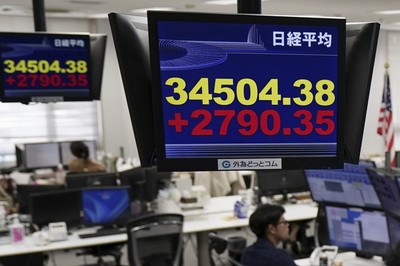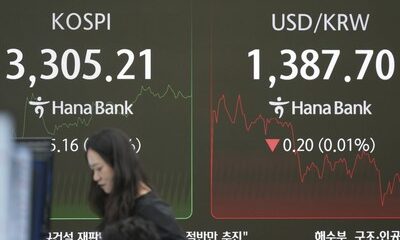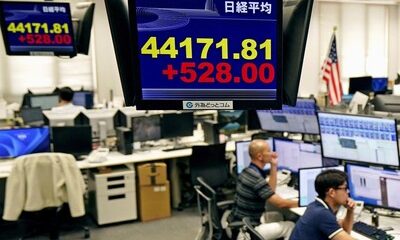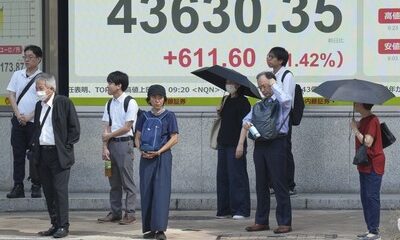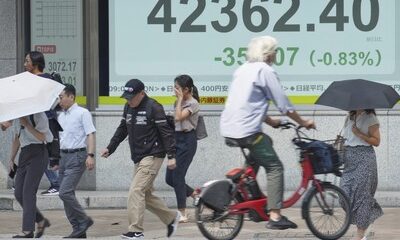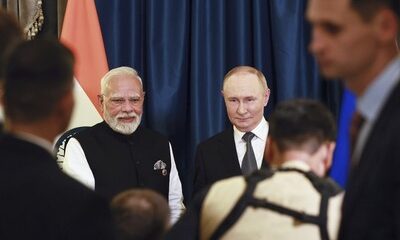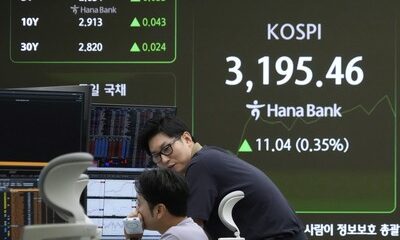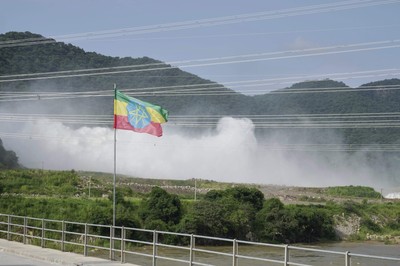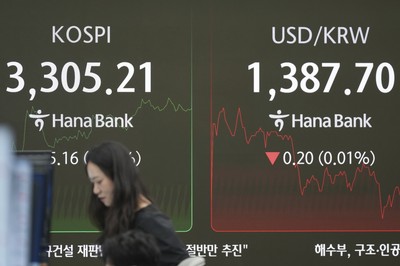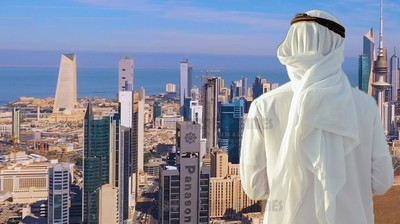TOKYO, April 10, (AP): World markets soared on Thursday, with Japan’s benchmark jumping more than 9%, as investors welcomed U.S. President Donald Trump’s decision to put his sharp tariff hikes on hold for 90 days, though he excluded China from the reprieve.
In early trading, Germany’s DAX initially gained more than 8%. It was up 7.5% at 21,141.53 a bit later, while the CAC 40 in Paris gained 7.2% to 7,360.23. Britain’s FTSE 100 surged 5.4% to 8,090.02.
However, U.S. futures edged lower and oil prices also declined. Chinese shares saw more moderate gains, given yet another jump in the tariffs each side is imposing on each others’ exports.
The future for the S&P 500 was down 0.4% while that for the Dow Jones Industrial Average edged 0.2% lower. Analysts had expected the global comeback given that U.S. stocks had one of their best days in history on Wednesday as investors registered their relief over Trump’s decision.
On Thursday, Japan’s benchmark Nikkei 225 jumped 9.1% to finish at 34,609.00, zooming upward as soon as trading began. Australia’s S&P/ASX 200 soared 4.5% to 7,709.60.
South Korea’s Kospi gained 6.6% to 2,445.06. Hong Kong’s Hang Seng added 2.4% to 20,750.65. The Shanghai Composite rose 1.2% to 3,223.64. Investors went “from fear to euphoria,” Stephen Innes, managing partner at SPI Asset Management, said in a commentary.
“It’s now a manageable risk, especially as global recession tail bets get unwound, and most of Asia’s exporters breathe a massive sigh of relief,” he said, referring to the tariffs on China, which Trump has kept.
On Wall Street, the S&P 500 surged 9.5%, an amount that would count as a good year for the market. It had been sinking earlier in the day on worries that Trump’s trade war could drag the global economy into a recession. But then came the words investors worldwide had been waiting and wishing for.
“I have authorized a 90 day PAUSE,” Trump said, saying more than 75 countries are negotiating on trade and not retaliating against his latest increases in tariffs. Treasury Secretary Scott Bessent later told reporters that Trump was pausing his so-called ‘reciprocal’ tariffs on most of the country’s biggest trading partners, but maintaining his 10% tariff on nearly all global imports.
China was a huge exception, though, with Trump saying tariffs are going up to 125% against its products. The trade war is not over, and an escalating battle between the world’s two largest economies can create plenty of damage.
U.S. stocks are also still below where they were just a week ago, when Trump announced worldwide tariffs on what he called “Liberation Day.” But on Wednesday, at least, the focus on Wall Street was on the positive. The Dow Jones Industrial Average shot to a gain of 2,962 points, or 7.9%.
The Nasdaq composite leaped 12.2%. The S&P 500 had its third-best day since 1940. The relief came after doubts had crept in about whether Trump cared about the financial pain the U.S. stock market was taking because of his tariffs. The S&P 500, the index that sits at the center of many 401(k) accounts, came into the day nearly 19% below its record set less than two months ago.
That surprised many professional investors who had long thought that a president who used to crow about records for the Dow under his watch would pull back on policies if they sent markets reeling. Wednesday’s rally pulled the S&P 500 index away from the edge of what’s called a “bear market.”
That’s what professionals call it when a run-of-the-mill drop of 10% for U.S. stocks, which happens every year or so, graduates into a more vicious fall of 20%. The index is now down 11.2% from its record. Wall Street also got a boost from a relatively smooth auction of U.S. Treasurys on Wednesday.
Earlier jumps in Treasury yields had rattled the market, indicating increasing levels of stress. Trump said he had been watching the bond market “getting a little queasy.” Higher yields on Treasurys put pressure on the stock market and push upward on rates for mortgages and other loans for U.S. households and businesses.
U.S. Treasury yields historically have dropped – not risen – during scary times for the market because the bonds are usually seen as some of the safest possible investments.
This week’s sharp rise had brought the yield on the 10-year Treasury back to where it was in late February. After approaching 4.50% in the morning, the 10-year yield pulled back to 4.34% following Trump’s pause and the Treasury’s auction.
That’s still up from 4.26% late Tuesday and from just 4.01% at the end of last week. In energy trading, benchmark U.S. crude fell 81 cents to $61.54 a barrel. Brent crude, the international standard, declined 93 cents to $64.55 a barrel. In currency trading, the U.S. dollar fell to 146.77 Japanese yen from 147.38 yen. The euro cost $1.0986, up from $1.0954.

 Latest News19 hours ago
Latest News19 hours ago
 Latest News20 hours ago
Latest News20 hours ago
 Latest News17 hours ago
Latest News17 hours ago
 Latest News16 hours ago
Latest News16 hours ago
 Latest News10 hours ago
Latest News10 hours ago
 Business24 hours ago
Business24 hours ago
 Politics20 hours ago
Politics20 hours ago
 Latest News12 hours ago
Latest News12 hours ago
